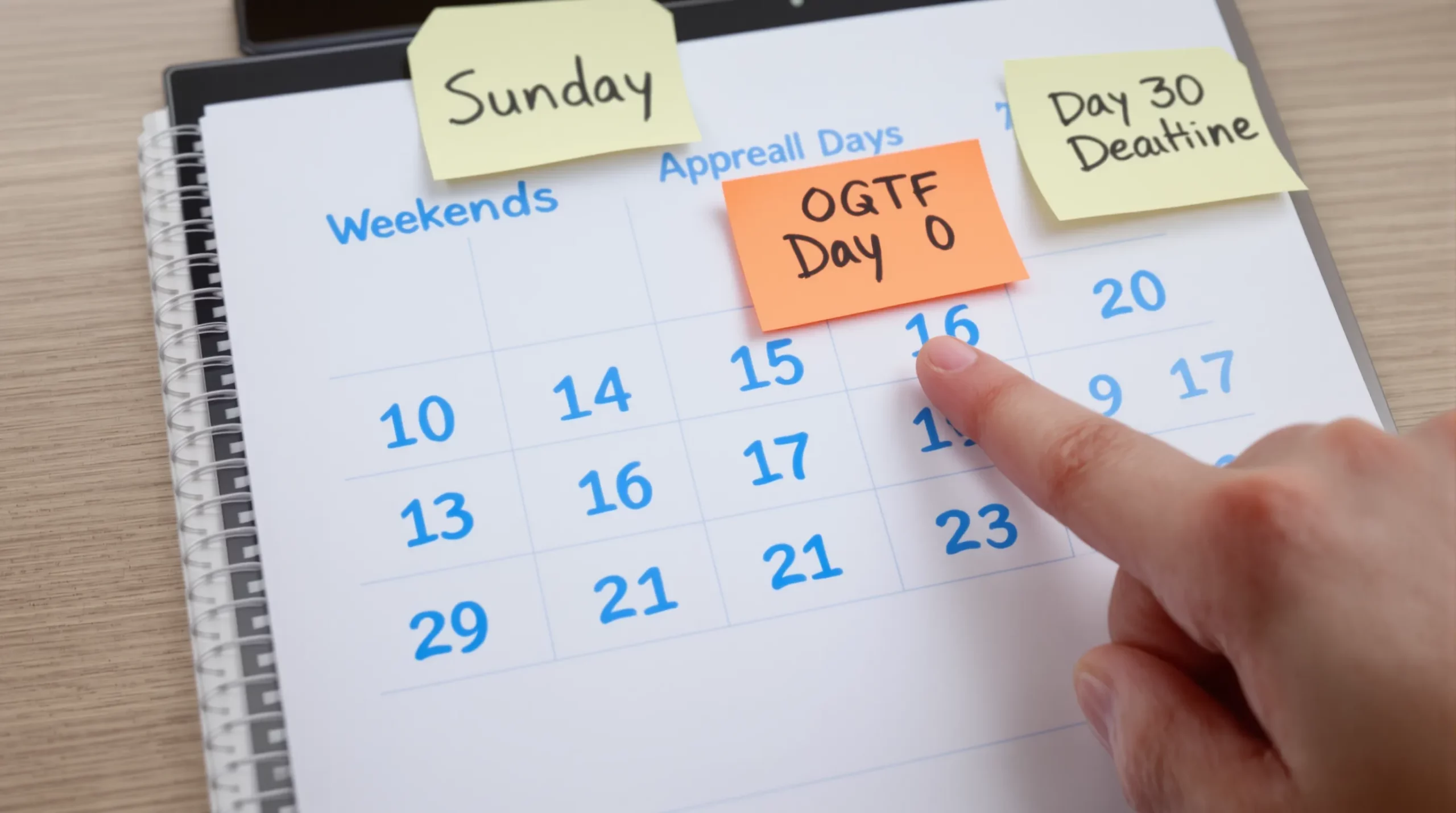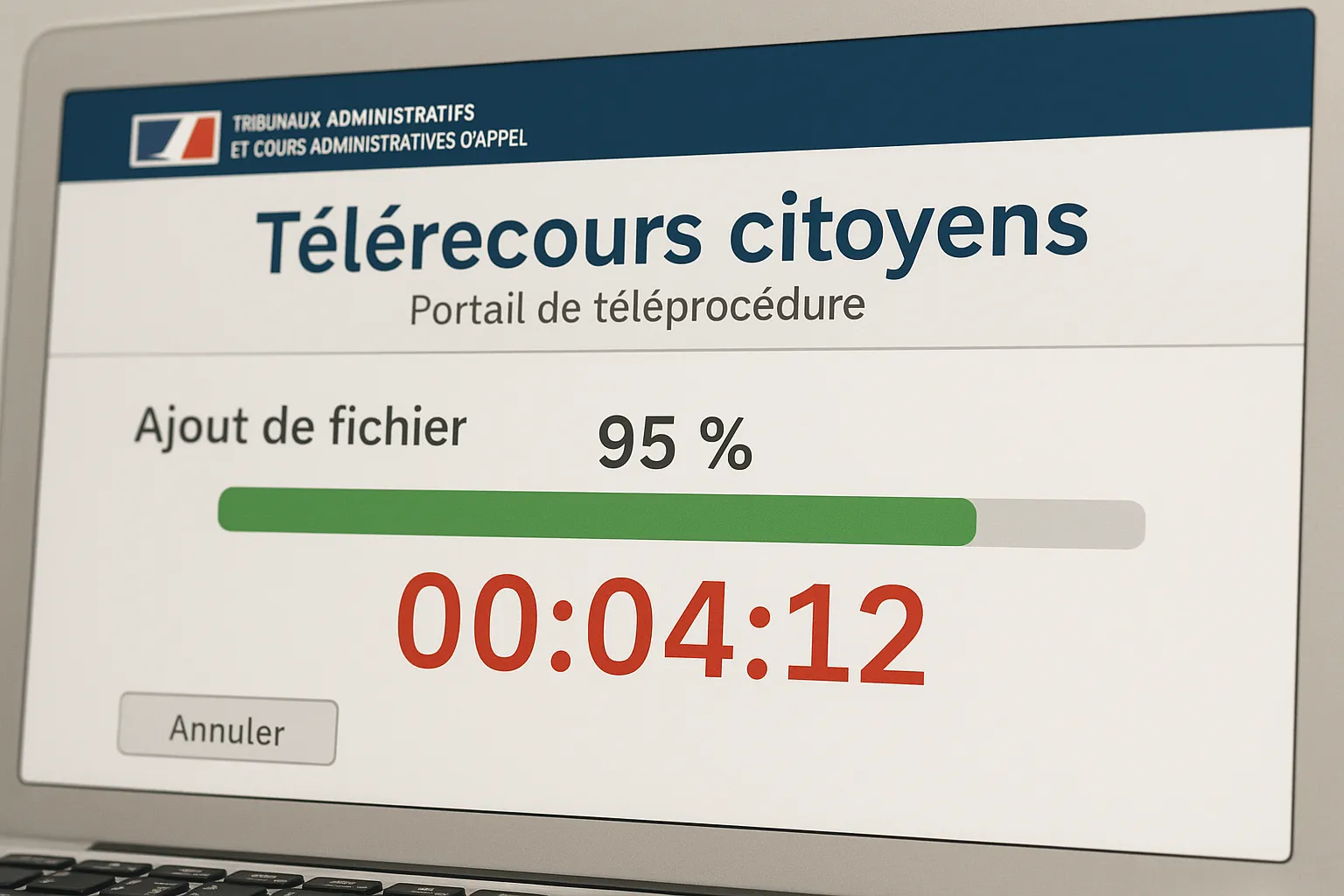Appeal Deadlines: Calculating Working Days vs. Calendar Days Correctly

Having only a few days to react after a prefecture decision or an OQTF can feel terrifying. Yet most appeal periods in French administrative law are perfectly predictable once you understand one crucial distinction: working days (jours ouvrables) are not the same as calendar days (jours calendaires). Miscalculating the last day to file even by a single day can lead to an automatic rejection by the Tribunal administratif.
Why the Difference Exists
French lawmakers set shorter deadlines for the most urgent immigration matters (for example, 48 hours to contest a custody order, 15 days for certain visa refusals, 30 days for an OQTF without detention). To avoid leaving foreigners helpless when a deadline ends on a Sunday or a public holiday, some statutes state the limit in working days, while others keep the classic calendar-day rule. Knowing which rule applies – and how to count correctly – is therefore a life-or-death matter for your file.
Key Legal Texts to Know
- Code de justice administrative (CJA) article R. 421-1 (general 2-month period in calendar days)
- CESEDA article L.512-1 and L.512-2 (OQTF appeals in calendar days)
- CESEDA article L.521-1-1 (appeal against refusal of a residence card on public-order grounds: working days)
- Decree n° 2024-1357 of 6 December 2024 on electronic notifications (starts the clock at 0 h 00 the day after the email/SMS is sent)
- Civil Code article 641 (postal time extension) – applies only when expressly mentioned, which is rare in immigration law
Definitions at a Glance
| Term | French wording | What counts | Typical examples |
|---|---|---|---|
| Calendar days | jours calendaires / jours francs | Every day of the week, including Saturdays, Sundays and public holidays | OQTF, visa refusal, naturalisation rejection |
| Working days | jours ouvrables | Mondays to Saturdays excluding public holidays (Sundays are always excluded) | Refusal of a VPF card citing ordre public, expulsion measure |
| Business days | jours ouvrés | Mondays to Fridays, excluding public holidays (rarely used in immigration) | Delivery deadlines in private contracts |
Important: if the statute says the appeal must be filed “dans un délai de X jours” without specifying ouvrables, the default interpretation is calendar days unless jurisprudence states otherwise.
Step-by-Step Method to Count Correctly
- Identify the legal basis in the notification letter. Look for phrases such as “conformément à l’article L.512-1 du CESEDA” or “dans un délai de quinze jours ouvrables”.
- Determine the starting point.
- Paper letter with acknowledgement of receipt (AR): Day 0 is the day after you sign the postal slip.
- Electronic notification (teleprocedure or email under the 2024-1357 decree): Day 0 is the day after the email or SMS is sent, even if you open it later.
- Hand delivery at prefecture or police station: Day 0 starts the next day at 0 h 00.
- Count forward using the right calendar. For working-day deadlines, skip every Sunday and each public holiday listed in the Labour Code article L.3133-1.
- If the last day falls on a non-counted day, shift the deadline to the next counted day (CJA art. R.421-5). For calendar-day deadlines, no shift is allowed – you must file earlier if the limit falls on Sunday or a holiday.
- File before midnight of the last allowed day via Télérecours citoyens or by lodging the registered letter at La Poste before the counter closes. The postmark is decisive.

Worked Examples
Example 1: 30-day calendar-day period (OQTF)
- AR letter signed on Monday 3 February 2025.
- Day 0 = 4 February.
- Count 30 calendar days → last day = Wednesday 5 March at 23 h 59. Even if 5 March is a public holiday in your département (it is not), you still must file on or before that date.
Example 2: 15 working days after a residence-card refusal based on public order
- Letter handed at prefecture on Thursday 10 April 2025.
- Day 0 = 11 April.
- Skip Sunday 13 April and Monday 21 April (Easter Monday public holiday).
| Count | Date | Day type |
|---|---|---|
| 1 | 11 Apr (Fri) | working day |
| 2 | 12 Apr (Sat) | working day |
| – | 13 Apr | Sunday skipped |
| 3 | 14 Apr (Mon) | working day |
| … | … | … |
| 13 | 30 Apr (Wed) | working day |
| 14 | 2 May (Fri) | working day |
| – | 1 May | Labour Day public holiday skipped |
| 15 | 3 May (Sat) | working day |
Deadline = Saturday 3 May 2025 before midnight. Because the time limit is expressed in working days, you may still lodge at the post office’s night-box on that Saturday.
Example 3: Two-month calendar period under CJA
The classic two-month period to contest a naturalisation refusal is always calendar days. Day-by-day counting is unnecessary: the last day is the same numeric date two months later (e.g., refusal notified 6 July → last day 6 September), unless the later month has fewer days, in which case use its final day (e.g., 31 January → 31 March).
2025 List of National Public Holidays to Exclude When Counting Working Days
| Date | Holiday | Always excluded? |
|---|---|---|
| 1 January | New Year’s Day | Yes |
| Easter Monday | Movable | Yes |
| 1 May | Labour Day | Yes |
| 8 May | Victory 1945 | Yes |
| Ascension Thursday | Movable | Yes |
| Whit Monday | Movable | Yes |
| 14 July | Bastille Day | Yes |
| 15 August | Assumption | Yes |
| 1 November | All Saints’ | Yes |
| 11 November | Armistice 1918 | Yes |
| 25 December | Christmas | Yes |
Some départements (Alsace-Moselle, French Guiana, etc.) have extra statutory holidays that must also be excluded. Check your local préfecture’s website.
Common Pitfalls (and How to Avoid Them)
- Confusing “jours francs” with working days. Jours francs simply means you do not count the day of notification itself; it does not cancel weekends.
- Relying on the email opening date. The timer starts when the administration sends the message, not when you click it.
- Missing the filing hour. Télérecours shuts down for maintenance at 22 h 00 some nights; submit before 21 h 30 to stay safe.
- Using the wrong time zone abroad. If you lodge an appeal from outside France, French time (CET/CEST) still applies.
- Counting Sunday as day 6 in working-day periods – Sundays never count, even if post offices open.
What If You Are Already Late?
French law leaves little room once a deadline has passed, but two remedies may resurrect your case:
- Relevé de forclusion (CJA art. R.421-5) – possible if you were “absolutely prevented” from acting (serious illness, imprisonment, force majeure) and you file within two months of cessation of that obstacle.
- Excusable error on the starting date – rare, but accepted when the prefecture’s letter fails to state the correct legal basis or mentions a wrong deadline. See Lost Prefecture Mail: Reconstructing Proof of Notification for practical steps.
If none of these apply, focus instead on a fresh regularisation route or a new application strategy. Our article OQTF vs. IRTF: Key Differences and Defense Strategies explains alternative options.

Practical Tools for Stress-Free Calculation
- Official calendar generator by the Conseil d’État: search “calendrier délais recours” on their site. It computes both working and calendar periods automatically.
- ANEF internal timer: when you receive an online refusal, the portal now displays the last filing date in red. Double-check anyway.
- Spreadsheet template (download link in your ImmiFrance dashboard) where you enter the notification date and choose the day type; the formula populates the deadline and warns about public holidays.
How ImmiFrance Helps You Beat the Clock
Every day our advisers handle urgent appeals, from 48-hour detention challenges to complex 15-page OQTF briefs. With ImmiFrance you get:
- Immediate deadline audit – we confirm in writing the exact last filing minute and mode.
- Certified calculation sheet you can append to your petition as proof of timeliness.
- Lawyer-drafted appeal templates tailored to your prefecture and legal grounds.
- Same-day Télérecours filing by a bar-registered partner when necessary.
- Real-time tracking so you see receipt stamps and court acknowledgements in your dashboard.
Do not let a counting mistake erase your rights. Book a 20-minute emergency call now or explore our detailed OQTF Explained guide to understand the full appeal process.
